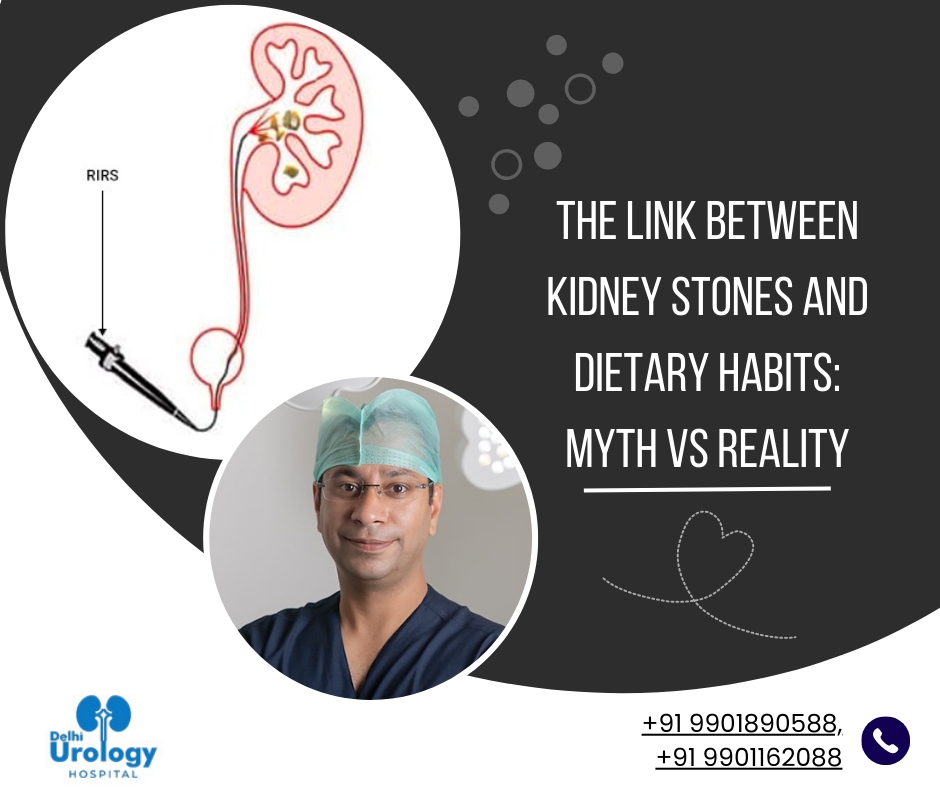Kidney stones are small, hard mineral deposits that form within the kidneys and can cause excruciating pain and discomfort. Over the years, various theories and claims have emerged about the role of dietary habits in kidney stone formation.
In this blog, we will delve into the facts and debunk some common misconceptions surrounding the link between kidney stones and dietary habits. The insights have been taken from expert urologists like Dr. Niren Rao, a renowned urologist who performs effective Kidney Stone Surgery in Delhi. Read on to learn about these misconceptions.
The Role of Hydration
Myth: Some people believe that excessive water consumption will flush out all kidney stones. While proper hydration is essential, solely relying on water intake to eliminate existing kidney stones is a misconception. Larger stones may require medical intervention, and water alone may not be sufficient to dissolve them.
Fact: Staying adequately hydrated is crucial to preventing kidney stone formation. Dehydration can lead to concentrated urine, which increases the risk of minerals crystallizing and forming stones. Drinking an ample amount of water dilutes urine and helps flush out minerals before they have a chance to aggregate into stones.
Sodium and Salt Intake
Myth: Cutting out all salt from the diet is not necessary or advisable. Our bodies need sodium for various functions, including maintaining fluid balance and nerve function. Instead of eliminating salt entirely, focus on consuming it in moderation and choosing healthier alternatives.
Fact: High sodium intake can lead to increased calcium excretion in the urine, which can contribute to the formation of calcium-based kidney stones. Monitoring salt consumption and opting for a low-sodium diet can help reduce the risk of stone formation.
Calcium Consumption
Myth: Some individuals mistakenly believe that reducing calcium intake will prevent kidney stones. However, depriving the body of the necessary calcium can actually increase the risk of stone formation. It's wiser to ensure sufficient calcium intake through dietary sources and supplements, if recommended by a healthcare professional.
Fact: Adequate calcium intake from dietary sources is essential for overall bone health and may actually reduce the risk of kidney stone formation. Calcium binds to oxalate in the intestines, preventing it from being absorbed and subsequently excreted in the urine as a stone-forming compound.
Oxalate-Rich Foods
Myth: Avoiding all oxalate-rich foods is not the solution. While limiting high-oxalate foods may be advisable for those with a history of calcium oxalate stones, completely cutting them out can deprive the body of valuable nutrients. Moderation is key; one can enjoy these foods as part of a balanced diet.
Fact: Oxalates are compounds found in certain foods that can contribute to the formation of kidney stones, particularly calcium oxalate stones. Consuming excessive amounts of oxalate-rich foods, such as spinach, soy products, and nuts, can increase the concentration of oxalates in the urine.
Protein Intake
Myth: Demonizing protein altogether is unwarranted. Protein is essential for various bodily functions, including tissue repair and immune system support. Opt for lean protein sources and ensure a balanced diet that includes a variety of nutrients.
Fact: High-protein diets, especially those rich in animal proteins, can increase the excretion of calcium and uric acid in the urine, potentially leading to stone formation. It's important to balance protein intake with other nutrients and maintain a healthy diet.
Conclusion
The relationship between kidney stones and dietary habits is complex and often influenced by individual factors such as genetics, medical history, and lifestyle choices. While there are undeniable connections between certain dietary factors and kidney stone formation, it's crucial to approach dietary changes with a well-informed perspective. Moderation, hydration, and a balanced diet remain key components of kidney stone prevention.
If one is concerned about kidney stone formation or has a history of kidney stones, consulting an urologist is recommended. These experts can provide personalized advice tailored to one’s unique situation, helping them make informed decisions to promote kidney health and overall well-being.
With more than 7000 successful kidney stone surgeries under his belt, Dr. Niren Rao, the best urologist in Delhi, offers the best kidney stone surgery. To get prompt relief from kidney stone-related problems or to learn the precise cost of kidney stone treatment, one can consult him. Dr. Niren Rao provides a wide range of comprehensive solutions for the treatment of kidney stones. With a wealth of experience in this specialized area, he is widely respected for his ethical approach and clinical expertise. He has established the Delhi Urology Hospital, a prominent establishment known for its excellence in kidney stone treatment in the city of Delhi.

Comments
Post a Comment